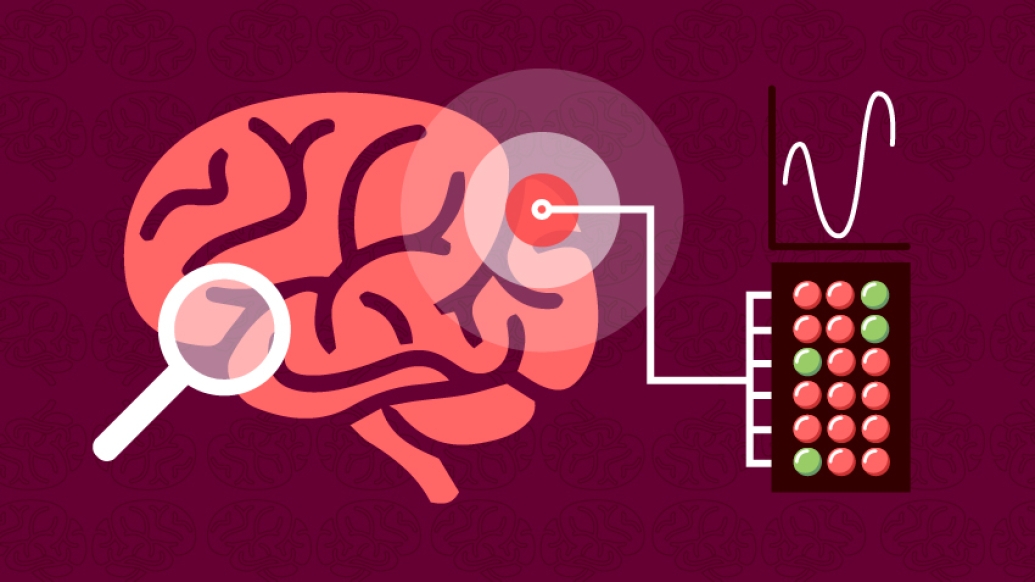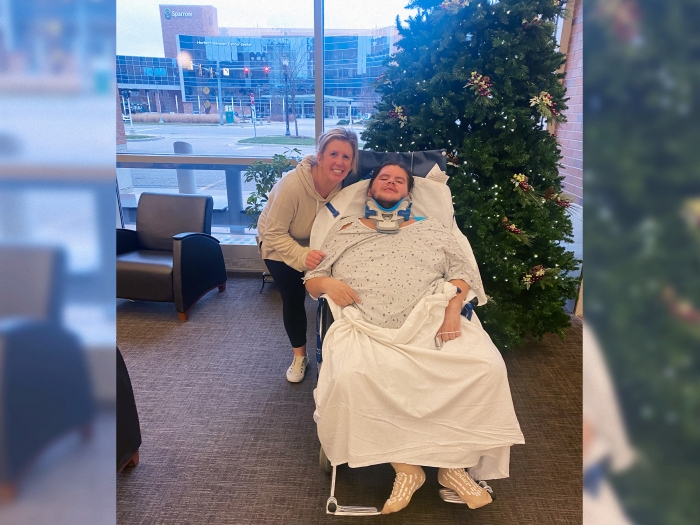Researchers hope the innovations and treatments they are currently investigating will be able to help patients with a traumatic brain injury in the future.
1:00 PM
Author |

To treat a traumatic brain injury, researchers are thinking outside the box.
"A traumatic brain injury can range from mild to severe, but is usually caused by a harsh bump or blow to the head," says Kevin Ward, M.D., a professor of emergency medicine and biomedical engineering at Michigan Medicine and director of the Michigan Center for Integrative Research in Critical Care (MCIRCC).
"A patient may experience a moment of dysfunction on the mild end, to unconsciousness and loss in brain function on the severe end of injury."
According to the Centers for Disease Control and Prevention, TBI is a serious public health problem in the United States. In 2014, there were approximately 2.87 million TBI-related emergency department visits, hospitalizations and deaths throughout the nation.
"Unfortunately, the current diagnosis, monitoring and treatment strategies for TBI have not significantly progressed over the last 30 years and have been ineffective at reducing the extent of the injury," Ward says.
Massey TBI Grand Challenge
Thanks to funding from the Joyce and Don Massey Family Foundation, MCIRCC hopes to improve treatment and survival rates for patients that experience a TBI. The Massey family had their own experience with TBI after a car accident injured mother and wife, Joyce Massey.
"Funding from the Massey Family Foundation has allowed us to institute the Massey TBI Grand Challenge," Ward says.
LISTEN UP: Add the new Michigan Medicine News Break to your Alexa-enabled device, or subscribe to our daily updates on iTunes, Google Play and Stitcher.
"The Grand Challenge aims to bring interdisciplinary teams together to create high-risk, high-impact, milestone-driven solutions that address the golden hours of care, or the treatment administered during the initial hours after injury, plus the 24 to 48 hours of care after a severe traumatic brain injury."
The funding also allows MCIRCC to host the Joyce Massey TBI Summit each fall. The conference brings together the nation's leading experts and researchers to discuss the most pressing challenges facing TBI care and how to work together to find innovative solutions.

The Massey TBI Grand Challenge encourages researchers to come up with "innovative and disruptive" TBI solutions and pitch them to an independent panel of clinicians, innovation and commercialization experts, national TBI experts and Department of Defense representatives.
MORE FROM MICHIGAN: Sign up for our weekly newsletter
"All of these great minds come together to push past the borders of typical TBI care," Ward says. "What starts as an idea, evolves and starts to take shape. Then the team participates in our Wolverine Den, or a U-M version of Shark Tank, pitching day with research behind their idea and support that it should be funded, as it could help potentially guide future treatments."
Five projects were selected for funding this year:
Using light wavelengths to target cells
Thomas Sanderson, Ph.D., an associate professor of emergency medicine and molecular and integrative physiology at Michigan Medicine, says that while the molecular events happening in the body during a TBI are complex and can vary, mitochondria, or the organelles in cells that help them stay energized, appear to be a common contributor to brain injury.
The research team proposed a non-invasive therapy that uses light wavelengths to target mitochondria and alter the molecular events happening inside cells during a brain injury.
Project and researcher: Evaluating Non-Invasive Mitochondrial Modulation in a Translational Model of TBI; Thomas Sanderson, Ph.D.
Valproic acid in TBI patients
Valproic acid is a type of medication generally used to treat patients with epilepsy and psychiatric disorders. Now, researchers hope it could be used to treat TBI.
The funded project will further investigate if valproic acid can successfully be used to treat patients with TBI and if so, the funds will help support an Investigational New Drug application.
All of these great minds come together to push past the borders of typical TBI care.Kevin Ward, M.D.
Project and researchers: Valproic Acid Treatment for Varying Severities of Traumatic Brain Injury; Ben Biesterveld, M.D., Hasan Alam, M.D., Manjunath Pai, PharmD, Jason Fawley, M.D., Aaron Williams, M.D., George Velmahos, M.D., Martin Sillesen, M.D., Glenn Wakam, M.D., and Michael Kemp, M.D.
Point-of-care device to monitor and measure biomarkers in real-time
Cerebrospinal fluid, the fluid found in the brain and spinal cord that protects them from trauma, and blood contain biomarkers that researchers say could play a role in how a TBI is diagnosed and monitoring the progression of the injury.
Mark Burns, Ph.D., and Frederick Korley, M.D., Ph.D., proposed a portable, point-of-care device that could measure biomarkers in the fluid and blood and display the results on a handheld device, such as a smartphone, within 15 minutes.
Project and researchers: Device for High Frequency and Real-Time Measurement of Biofluid Biomarkers; Mark Burns, Ph.D., Frederick Korley, M.D., Ph.D.
Intranasal insulin therapy to protect the brain
Intranasal insulin, or insulin nasal spray, is already in clinical trials for Alzheimer's disease and stroke, but researchers hope to prove it can successfully protect the brain when a high-dose is given to a TBI patient soon after injury.
The nasal spray speeds up the ability for the hormone to get to the brain through small blood vessels in the nose, instead of waiting for it to enter and go through the bloodstream when administered in the arm or stomach.
The research team will study the neuroprotective effects of an early dose and a treatment strategy where non-medical providers could administer the dose to a TBI patient right after the injury takes place.
Project and researcher: Neuroprotection with Intranasal Insulin after Traumatic Brain Injury; Tulasi Ram Jinka, DVM, Ph.D., and Robert Neumar, M.D., Ph.D.
Device to measure and monitor systolic blood pressure
Systolic blood pressure indicates the amount of pressure in the arteries when the heart pushes blood through the arteries to the rest of the body. A drop of systolic blood pressure below certain levels can dramatically worsen TBI. Unfortunately, monitoring critical levels of systolic blood pressure is very difficult.
The research team previously developed a device that provides automated, targeted systolic blood pressure monitoring. In this project, the group will refine and test the next iteration of their device to ensure it can provide continuous readings of a patient with TBI's systolic blood pressure and keep it at a level needed for optimal TBI management.
Project and researchers: STAT: Systolic Target Assessment Tool; David Hackenson, M.D., Hakam Tiba, M.D., and Kevin Ward, M.D.
Future care
MCIRCC encourages researchers, clinicians and stakeholders to attend its future TBI events.
"By working collaboratively, we can pioneer a new path to transform TBI care," Ward says.
"We hope the innovations our MCIRCC members are researching now, will result in improved care in the near future."
Investigators are welcome to attend the Massey TBI Summit this fall. Additional information can be found on the MCIRCC website.

Explore a variety of health care news & stories by visiting the Health Lab home page for more articles.

Department of Communication at Michigan Medicine
Want top health & research news weekly? Sign up for Health Lab’s newsletters today!





